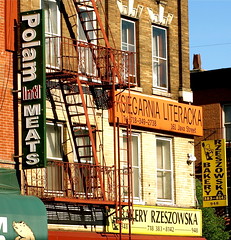The courting of Latino voters by Senators John McCain and Barack Obama has been highly publicized because of the potential power of this group in the general election. Both candidates appeared at the National Association of Latino Elected Officials conference last week and will appear before another major Latino group, the National Council of La Raza, in the second week of July.
Smaller ethnic communities in the US rarely get that kind of attention from a presidential candidate. But when they do, it helps them feel appreciated and more involved in the electoral process.
Obama has won admirers in the Polish community for doing just that.
“Obama has said that he is in favor of including Poland in the Visa Waiver program and McCain has not,” said Polish American journalist and author Alex Storozynski, in a recent survey on presidential candidates by Nowy Dziennik/the Polish Daily News among members of the Polish community living in the New York metropolitan area.
Including Poland in the Visa Waiver Program would allow Polish citizens to enter the US for tourism or business purposes for up to 90 days without having to obtain a visa. The issue has been a long time goal of the Polish government and Polish American organizations such as the Polish American Congress. They insist that Poland, a member of the European Union and NATO which has sent troops to Afghanistan and Iraq, should also be able to participate because it has shown loyalty to America.
Obama addressed this issue in an interview with Nowy Dziennik that ran on January 26-27, 2008. “We should aim at eliminating visas for countries like Poland, which are members of both the EU and NATO. Current visa regulations are outdated and do not reflect strategic relationship between our countries nor historically close ties between our nations.”
Obama was the only presidential candidate who gave an interview to Nowy Dziennik. Obama also talked about another issue important from Poles’ perspective: the Bush’s administration plans to install 10 missile interceptors in Poland as part of the missile defense system (MDS). In exchange Poland wants to cover part of the cost of modernizing the Polish army and its defense system. Otherwise it may not agree to install interceptors; especially since the Polish public is unenthusiastic about this idea. Moreover, the Russian government warns that the plan could hurt the Polish-Russian relationship, if Moscow’s concerns are not addressed.
In the interview with Nowy Dziennik, Senator Obama questioned the logic of installing the missile defense system in Poland before its technology is fully tested. He also said the Bush administration did a poor job in terms of consulting on the plan and the location of MDS with other NATO allies. Obama stressed that even though this initiative posed no threat to Russia, Moscow should be fully informed about the plan.
On the other hand “McCain was an early and strong supporter of anti-missile defense and his website highlights “Effective Missile Defense,” says Professor John Micgiel, Director of Columbia University’s East Central European Center. “But as far I know, Senator McCain has not spoken about placing interceptors in Poland. Nor has he spoken about any other aspects of US-Polish relations, as far as I know.”
Another aspect of Obama’s popularity among Poles has to do with the fact that he got the support of Zbigniew Brzezinski, currently a scholar at the Center for Strategic and International Studies and former National Security Advisor to President Jimmy Carter, which makes him the highest ranking Polish American in a US administration in American history.
As early as August 2007 Brzezinski said: “Obama is clearly more effective and has the upper hand. He has a sense of what is historically relevant and what is needed from the United States in relationship to the world.”
For Poles, Brzezinski’s support sends a clear signal that Obama will be friendly toward issues important to their community. This opinion was also expressed by representatives of the Polish entrepreneurial world, many of whom support McCain’s approach to economic issues.
Bozena Kaminski, Director of the Polish & Slavic Center and one of those interviewed in Nowy Dziennik‘s survey, identifies as a Republican and says she will vote for her party’s candidate.
Nevertheless, she stressed that “from the point of view of Polish immigrants, Obama’s program is currently friendlier. His approach to undocumented immigrants is considerably more lenient than McCain’s, who is rather conservative. Even though McCain supports legalizing their status in an attempt to win more support among the conservative electorate, he has recently been very tight-lipped on the immigration issue.”
Talking about issues important to ethnic communities may turn out to be a good strategy for Obama. Many immigrants are often more interested in the politics of their home countries. Bringing up issues vital to them is a way to get them involved in American political scene. It could possibly translate into higher turnout among naturalized citizens of various origin.




 In “
In “